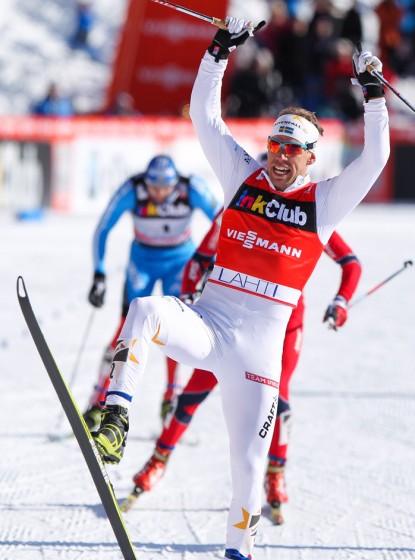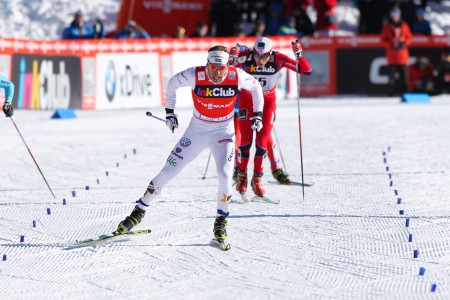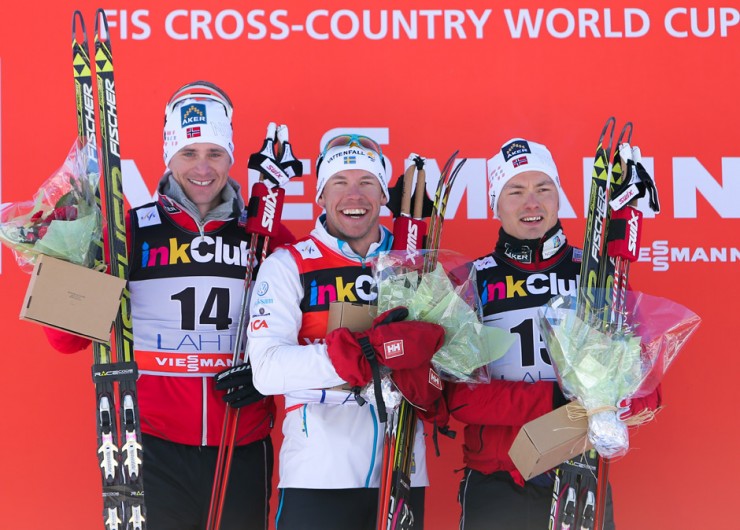
Just over two weeks ago Emil Jönsson (SWE) was leading the World Championship sprint with 500 meters to go. With unrivaled finishing speed, the race was his to lose.
And lose it he did. The veteran faded in the last third of the challenging Val di Fiemme course, slipping to fourth, and holding his championship medal count in the sprint at a single bronze from 2011.
He bounced back to pair with Marcus Hellner to earn silver in the team sprint, and demonstrated he is still the sprinter to beat today, employing the finishing kick that eluded him in Italy.
On short, relatively flat and fast course, Jönsson toyed with his competition through the first two rounds, before abusing Norwegian Ole Vigen Hattestad in the final 100 meters for the win in Lahti, Finland.
Another Norwegian, Finn Haagen Krogh took the final podium spot, outlunging Nikolay Chebotko (KAZ) at the line.
With several sharp corners, including a full hairpin, and a little climbing, the race was as much about tactics and ski handling as fitness.
With just a few places to pass, Jönsson picked his spots perfectly. After leading early in his quarterfinal, he slipped back to third, before powering up to the lead on the wide roller just before the small ascent to the hairpin.
The 90 degree swing played a significant role in most heats. Skiers outside of the top two quickly found themselves staring down a gap as jockeying for position around the bend prevented acceleration through the turn.
Jönsson came out five meters ahead, and quickly doubled that margin, ultimately cruising to the line while removing his poles before crossing.
The semis played out in nearly the same fashion. The Swede took an early lead before giving up the top spot on the climb. But once again on the roller, he moved into first as the hairpin approached.

While he was unable to gap the field this time through, he held pole position entering the homestretch and easily outpaced the competition, initiating pole removal before hitting the line.
The World Championship sprint may have not played out exactly how Jönsson wanted, but he has still had a phenomenal season.
That cannot be said of Hattestad who did not start his first World Cup race until mid-January this year.
He placed 8th and 44th in the two World Cup events leading up to the Championships and was just 6th in the Norwegian National Championship sprint.
Yet he still made the team for Italy, but was unable to advance past the semifinals.
The two time Sprint Cup Champion has been left without his top speed this year, but in Lahti, through the early rounds, he was in strong form.
One of the smoothest skiers on the circuit, he won both his quarterfinal and semifinal, setting up a showdown with Jönsson.
It was Hattestad who made the first move. He led right out of the start, with teammate Krogh and top-qualifier Gleb Retivkyh (RUS) between him and Jönsson.
The Norwegian held his ground over the top of the climb, and down over the roller, inching over just enough to prevent Jönsson from repeating his strategy from the earlier heats.
All six men were tightly clustered entering the hairpin, but Hattestad and Jönsson held the all-important top two spots.
With the four behind on top of each other, the leaders hit the final descent with a five-meter lead.
Krogh came out of the scrum first, leading Chebotko, but too far back to challenge for any more than third.
As the race headed into the long sweeping turn to the homestretch, Jönsson pulled alongside Hattestad, forced to take the long route on the outside. But the speed of the Swede was that of a champion, and Hattestad was not on par.
Out of the turn, Jönsson accelerated stepping in front and leaving Hattestad far behind. Krogh held off Chebotko for third with both men timing impressive lunges.

Jönsson was ecstatic after the win, taking the individual victory and also locking up the overall Sprint Cup for the third time in his career. He won in both 2010 and 2011, but slipped to eighth last year.
He told FIS News after the race that he “felt good all day.”
He pointed to the need to focus on the fast run to the finish with the field so tightly packed. And with Hattestad leading in the final, he was forced to modify his pre-race strategy.
Because of his down season, rife with health problems, Hattestad had no complaints as runner-up.
“Second place feels like victory for me,” Hattestad told FIS News. “The course here fit me perfectly as I did not train as much as other guys. The podium today is very important for my self-confidence especially for the Olympic winter.”
Krogh was also pleased, and was unfazed by the course.
“Almost every sprint course fits me as long as it is in free technique,” he said.
Racing continues on Sunday with a 15k classic individual start.
Topher Sabot
Topher Sabot is the editor of FasterSkier.



